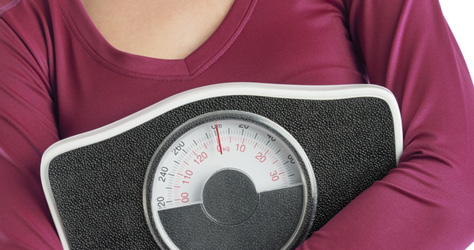It’s estimated that 28% of kids between two and 15 are overweight or obese in the UK, which puts them at risk of heart disease and stroke later in life.
The first thing to do is establish whether they’re definitely overweight: ask your GP or health visitor or work out their Body Mass Index (BMI) using a specialist children’s calculator.
The other piece of good news is that your child won’t actually have to lose weight. Because they’re growing quite fast, you may just need to keep their weight the same for a while - and as they get taller, they’ll simply grow into it.
There are two ways to do this: look at their eating habits and make sure they get more running-around time.
At a glance
- It’s estimated that 28% of kids between two and 15 are overweight or obese in the UK
- Ask your GP or health visitor or work out their Body Mass Index
- Once your little one is walking they should be getting three hours’ physical activity every day

Physical exercise
Once your little one is walking they should be getting three hours’ physical activity every day. It burns the calories they’ve eaten and also helps develop strong healthy bones and muscles. Three hours is quite a lot to fit in, so if you’re using the car or buggy for nursery or pre-school runs and shopping trips, can they walk a bit of it instead? If they’re watching big chunks of TV, try reducing it and take them to the park or for a run around in the garden instead.
Food
If everyone struggles with their weight in the household, it’s a good moment to take a critical look at what might be causing it. Do you tend to grab snacks on the go rather than sit down for proper meals? Do you eat a lot of ready meals and processed food like pizza and chips? Do you tend to reach for the biscuits when the kids are hungry? Do they love fizzy drinks?
Here are some tips:
- Keep pizza, chips etc for a once weekly treat
- Keep healthy snacks within easy reach: small cubes of cheese, oatcakes, toast fingers, fruit, and carrot/cucumber sticks
- Don’t allow fizzy drinks and only give diluted juice at mealtimes
- Aim for five portions of fruit and veg a day. You can blend them into pasta sauces, smoothies and soups if they’re not keen
- Keep their portion size realistic and don’t insist they finish everything on their plate if they’re full
- Encourage them to sit at the table for meals and snacks. Keep the TV switched off so they’re not eating without thinking
- Make sure they’re getting enough sleep, as sleep deprivation can cause weight gain in both adults and children
Your health visitor can help with more advice. You can also join the Government’s Change 4 Life health and weight loss programme